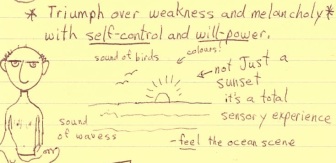 This is about “How to disappear completely” (in a good way).
This is about “How to disappear completely” (in a good way).
Some people get the wrong idea about “disappearing.” As Arthur Schopenhauer (1788-1860) saw it, reducing self interest leads to the “calm and confident serenity afforded by the virtuous disposition and a good conscience…” (Nineteenth Century Philosophy, p. 120).
Moreover, says Schopenhauer, “The egoist feels himself surrounded by strange and hostile phenomena and all his hope rests on his own well-being…”

“The good person lives in a world of friendly phenomena… the knowledge that every living thing is just as much our own inner being-in-itself as is our own person, extends our interest to all that lives; and in this way the heart is enlarged” (p. 120).

“Therefore, although the knowledge of the lot of man generally does not make his disposition a cheerful one,” writes Schopenhauer, “the permanent knowledge of his own inner nature in everything that lives nevertheless gives him a certain uniformity and even serenity of disposition” (p. 120).
And, as we all know, serenity is so enjoyable.

Serenity is freedom and tranquillity is lovely. It is time once again for all good philosophers to enjoy the lighter side of being.

According to science, perceptions of time and motion depend upon the observer’s position. Heisenberg’s uncertainty principle, quantum mechanics, chaos theory and complexity theory all point to things being relative.
 If you’re a relativist, it’s not that things aren’t true one way over another, it’s just that, what’s true for you might depend upon context, laws of physics and your personal and cultural beliefs.
If you’re a relativist, it’s not that things aren’t true one way over another, it’s just that, what’s true for you might depend upon context, laws of physics and your personal and cultural beliefs.
But for now, for the sake of something profundus—that’s Latin for “deep, boundless, and not bounded”—we set relativism and all other isms aside.
Imagine you are a marble trapped inside a three-dimensional box.
You hover around inside this box. You see six walls and eight corners. If you move in any of the familiar dimensions—up/down, left/right and front/back—you hit a wall.
There is no escape.

Now imagine your marble body “lifting” into the fourth dimension of time (as shown in ghostly red in the illustration). In this “lifting” your position remains unchanged. You don’t come near the walls. You simply elevate to a new three dimensional layer of the four dimensional space.
As you “lift” into the fourth dimension, you see your storied existence as if from a distance. You see the universe interconnecting.
This isn’t a shift to selflessness—that is to say, you give of yourself and still see separation. This is the freedom to rest your face completely (even if it makes you look angry).
 This is a shift from first person—“I am living my life! We do things our way”—and second person—“You wait here”—to third person—he, she, it, they—with one’s self observed and observing.
This is a shift from first person—“I am living my life! We do things our way”—and second person—“You wait here”—to third person—he, she, it, they—with one’s self observed and observing.
From this perspective, everything is you. A child kills herself—that’s you. Ducks in the park—that’s you.
Begin perspective shift and self expansion (and we don’t mean a pig-out on Cheesies).
You are like a disembodied narrator describing. You can’t see through a character’s eyes, but you can imagine.
This awareness of your self as subjective and objective interconnected, pops the bubble of how you see the world.

This is the realization that other people are as water-balloons floating in water. “I am who I am,” as someone once said. It’s a sentiment we have when we look in a mirror and think of Popeye.
This is the freedom to be what you are and will be.
Read the following instructions and then do them:
- Look around.
- Go for a walk without swinging your arms.
- Look at everything from the side of your eyes.
- Listen as if you hear something.
- Walk and look at the ground as if you’re 30,000 feet up above in an air-plane.
- Think to yourself, “This is me. This is me seeing. I see this. This, is what I see. I can see myself seeing.”
Shazam.
You shift from outside world and inside self separated to a world of here and now as perceived by the one perceiving. It is all of a thing. From a third person self-included perspective, you shift to a decentralized position. You see yourself and others as funny (in a nice way). What you see is seen and seeing.

Just as Nicolaus Copernicus (1473-1543) shifted from Earth as centre to sun followed by NASA shifting from sun as centre to a supermassive black hole called Sagittarius A-star! so too can you shift from yourself as centre in space and time to a decentralized position in an imagined fourth dimension. This shift is revolutionary and quite possibly could save the world (and probably will).
Like Mike Milligan said (Mike Milligan is a character in season 2 of Fargo), “Now, ironically, in astronomy, the word “revolution” means “a celestial object coming full circle. Did you know that? Which, if you think about it, is pretty funny, considering here on earth it means “change.”
This shift is an epiphany. From a first person perspective your life began and will end. All you really know is, “I am here,” but there are two ways to look at “I am here.”
The first way is to say that an individual person is located in a place called “here.” In this, you, as a self, experience the world as separate from your body.
The second way to look at it goes in the opposite direction. The statement, “I am here,” is a statement of fact. It means what it says. It means that “I am here,” Literally. It is to see yourself in what you’re seeing. “Here” is not just a location, but everything and you’re in and of it.
I am here,” is like saying, “I am Jimmy,” or “I am bored.”… I am here.

This is the third person perspective. You switch from a world of “things” ‘out there’—positive shapes against a negative background from a single vantage point, that being, your body—to seeing the space between not as empty but as connecting. With this shift in awareness, you see yourself as the place you are seen in.
To loosen a knot one must trace a string’s path and slowly loosen things up. To loosen the knots of a befuddlement one must first be self-aware. Self-ignorance is a leading cause of unhappiness, insecurity and self-injury. (But no more.)
Today, with the resting-face of true freedom, we accept our lot in this life with humour and love for this story that we tell and are told has an ending.
References:

 As hard as it is to imagine, one day, there won’t be another. One day, nothing will happen and you won’t know what happened. You will be gone like those who have gone before you.
As hard as it is to imagine, one day, there won’t be another. One day, nothing will happen and you won’t know what happened. You will be gone like those who have gone before you.












 Each moment must pass away for us to live another. Death is a continuous process.
Each moment must pass away for us to live another. Death is a continuous process.

 At the prospect of death Walter corrupts his morals for money. He thinks ‘ends justify means,’ and finds himself enjoying money and power. Money and power become his purpose.
At the prospect of death Walter corrupts his morals for money. He thinks ‘ends justify means,’ and finds himself enjoying money and power. Money and power become his purpose.
 Time can feel like a Sword of Damocles hanging above your head. Anybody who enjoys wealth, luxury and power lives under threat and anybody who has nothing envies those who have what they want. Gated communities imprison the pampered as poverty imprisons the poor. Questions about whether or not you’re making the most of your time happen when you’d rather be doing something else. In moments of boredom, irritation and/or annoyance, that’s when the present turns into the past like the end of a toilet paper roll running out fast.
Time can feel like a Sword of Damocles hanging above your head. Anybody who enjoys wealth, luxury and power lives under threat and anybody who has nothing envies those who have what they want. Gated communities imprison the pampered as poverty imprisons the poor. Questions about whether or not you’re making the most of your time happen when you’d rather be doing something else. In moments of boredom, irritation and/or annoyance, that’s when the present turns into the past like the end of a toilet paper roll running out fast.
 You’re like a candle burning itself out. Time for you to lighten up. Remember what Mary Poppins said, “In every job that must be done, there is an element of fun. You find the fun and, ‘Snap!’ The jobs a game. And every task you undertake becomes a piece of cake, a lark, a spree, it’s very clear to see” (“
You’re like a candle burning itself out. Time for you to lighten up. Remember what Mary Poppins said, “In every job that must be done, there is an element of fun. You find the fun and, ‘Snap!’ The jobs a game. And every task you undertake becomes a piece of cake, a lark, a spree, it’s very clear to see” (“ When you drop labeling things as “I” and “mine,” you feel the world directly. Disturbing emotions are empty of identify and so is everything else. Look at the one who feels. Look without distraction and anger turns to nothing. Nothing stands alone. Everything is taken together. You see the world through a window where what’s outside is seen through your own reflection. We divide between self and everything else but everything else is one seamless landscape.
When you drop labeling things as “I” and “mine,” you feel the world directly. Disturbing emotions are empty of identify and so is everything else. Look at the one who feels. Look without distraction and anger turns to nothing. Nothing stands alone. Everything is taken together. You see the world through a window where what’s outside is seen through your own reflection. We divide between self and everything else but everything else is one seamless landscape.





 That we split reality between observer and observed isn’t obvious. We’re often on auto-pilot, thinking thoughts that may or may not be stupid, but sometimes—on vacation, while washing dishes or doing nothing, in a relaxed moment—we emerge from being babies in a baby world to feeling aware of our self being here in this world!
That we split reality between observer and observed isn’t obvious. We’re often on auto-pilot, thinking thoughts that may or may not be stupid, but sometimes—on vacation, while washing dishes or doing nothing, in a relaxed moment—we emerge from being babies in a baby world to feeling aware of our self being here in this world! Today we celebrate you! We celebrate you, not to be egotistical, narcissistic, solipsistic or to show you how equally equal you are with 7.5 billion other people (according to a
Today we celebrate you! We celebrate you, not to be egotistical, narcissistic, solipsistic or to show you how equally equal you are with 7.5 billion other people (according to a 



 “Is that what it feels like to die?” she wonders, looking around at what was old made new.
“Is that what it feels like to die?” she wonders, looking around at what was old made new.
 Flash – you’re at work. Splash – you’re eating dinner. Zip it’s tomorrow, all the while, without interruption, you’ve been yourself to you alone.
Flash – you’re at work. Splash – you’re eating dinner. Zip it’s tomorrow, all the while, without interruption, you’ve been yourself to you alone. A woman says, “I’m Mavis. I live in Moose Jaw. I’m middle-aged, overweight and I work at Tim Hortons.”
A woman says, “I’m Mavis. I live in Moose Jaw. I’m middle-aged, overweight and I work at Tim Hortons.”



 In 1927 a small woman with a big heart named Lee Morse sang, “Oh, we ain’t got a barrel of money. Maybe we’re ragged and funny, but we’ll travel along, singing a song – side by side” (“
In 1927 a small woman with a big heart named Lee Morse sang, “Oh, we ain’t got a barrel of money. Maybe we’re ragged and funny, but we’ll travel along, singing a song – side by side” (“ In 1784 a small man with a big head named Immanuel Kant wrote “
In 1784 a small man with a big head named Immanuel Kant wrote “
 When we try to improve ourselves, we can’t seem to because the one that needs improvement is the one trying to improve! Spiritual entertainer Allan Watts said that it’s the equivalent of trying to pull yourself up by your own bootstraps and it can’t be done.
When we try to improve ourselves, we can’t seem to because the one that needs improvement is the one trying to improve! Spiritual entertainer Allan Watts said that it’s the equivalent of trying to pull yourself up by your own bootstraps and it can’t be done.



 Your mood could be open to enjoyment like a 24 hour diner or closed like a bank after 5 PM. It’s a matter of will and 1-2-3:
Your mood could be open to enjoyment like a 24 hour diner or closed like a bank after 5 PM. It’s a matter of will and 1-2-3:
 Let’s say you had an argument. You’re mood is angry and sad. You know life is short. You take action. You go into nature (wherever that happens to be) and you see a sunset.
Let’s say you had an argument. You’re mood is angry and sad. You know life is short. You take action. You go into nature (wherever that happens to be) and you see a sunset.
